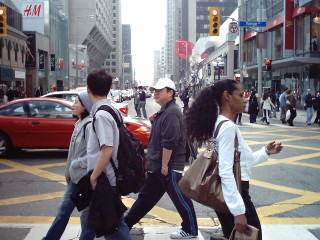Summary Judgment not granted where the inconsistencies of several witnesses and conflicting material evidence required an evaluation of credibility. There were additional issues relating to the Doctrine of Spoliation and adverse inference. Exercising the additional fact-finding powers under Rule 20.04 was not appropriate as it would amount to conducting a full trial under the guise of a Summary Judgment Motion and be contrary to the intention of Rule 20.
Released March 1, 2017 | Full Decision [Document Bank]
The Plaintiff was injured in a slip and fall incident that occurred on May 2, 2013. She alleged that she slipped and fell on grease or a dark lubricant in a Wal-Mart store.
The Defendant, Wal-Mart Canada Corp. (“Wal-Mart”), brought a Motion for Summary Judgment to dismiss the action stating that there was no genuine issue requiring a trial.
The Factums and Motion Records were extensive and included the examination and cross-examination transcripts of eight (8) deponents.
Wal-Mart’s positon was that there was no evidence of any slippery substance on the floor and attributed the fall to the Plaintiff’s high-heeled shoes. Regardless, they submit that they had a reasonable system of inspection and maintenance in place and upheld their standard of care.
Barnes J. indicated that even if he agreed that the Plaintiff slipped on grease or a dark lubricant, he would still be required to evaluate whether Wal-Mart had a “reasonable and properly functioning system of inspection and maintenance in place to ensure the safety of individuals in the store”. Michael Giordano, counsel for the Plaintiff, argued that the documentary evidence and the evidence of employees working in the store at the time of the incident, established that there were deficiencies with Wal-Mart’s system and proved it was not functioning properly at the time of the fall.
In his decision, Barnes J. found that the evidence revealed questions as to whether the maintenance employees were carrying out their duties prior to the fall and if they clearly understood what was expected of them according to Wal-Mart’s system. As a result, he found that a trial was required to address these issues.
Spoliation arguments were also made by each of the parties. The Plaintiff argued that because the CCTV footage depicting the location of the fall was not preserved or in existence at the time of the Motion, the Court should draw an adverse inference in support of the Plaintiff’s version of events. Conversely, the Defendant made similar arguments relating to the Plaintiff’s footwear which was also not available. Barnes J. opined that whether the Doctrine of Spoliation applied would be crucial to resolving the inconsistencies and conflicting evidence, however, he reasoned that that the determination should be left to the discretion of the trial judge.
Last, the Court considered the extended fact-finding powers afforded under the revisions to Rule 20.04 (2.1) and (2.2) as interpreted by the Court in Hyrniak v. Mauldin, 2014 SCC 7 and found that, considering the multiple witnesses and amount of evidence involved, to exercise such powers would amount to “conducting the full trial under the guise of a Summary Judgment Motion” and would “not be a proportionate, more expeditious, and less expensive means to achieve a just result.”
Plaintiff’s Counsel: Michael Giordano, Avanessy Giordano LLP.
Defendant’s Counsel: Stephen G. Ross and Meryl Rodrigues, Rogers Partners.
Read the full decision on the OTLA Document Bank










